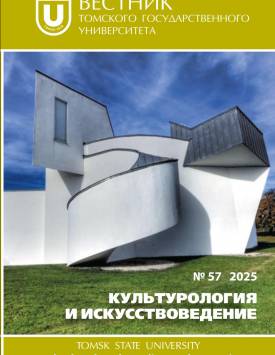The ontologies of poetry in the mirror of extroverted and introverted personality myths. On the material of creativity poets Nikolaj Ignatenko and Elena Klimenko
The article analyzes the influence of extroversion and introversion trends on the ontological characteristics of the poetry worlds. The initial provisions are follows: 1. all poetic worlds are precedent phenomenon; 2. poetic ontologies relate to the picture of the world through natural language; 3. poetic ontologies are redundant; at the same time they interact with each other freely, non-hierarchically. The research subjects were poems and personal myths of poets Nikolaj Ignatenko and Elena Klimenko, reconstructed on the material of their texts, statements (published autobiographies and interviews) and gestures in social space. The poetic ontologies created by Nikolai Ignatenko and Elena Klimenko are quite modern world descriptions; moreover, they are opposite to each other in terms of the prevailing tendency (extroversion and introversion, respectively), and in their pathos. The results of the study are presented in the form of a system of antinomies characterizing differences in space-time relations in extroverted and introverted worlds. The study uses the comparative typological method and the method of ideal types, lexical and semantic analysis. The analysis of space-time relations is aimed at: the properties of conceptual space and time and perceptual space / time, the strategies of development of the space/time, technologies of the self, social transaction characteristics. In poetic ontologies, they are represented by systems of relations: spatial-temporal, subject-object, subject-subject relations, Ego-Ego relation (self-relation). It has been established that one of the most important differences between extroverted and introverted ontologies, extroverted and introverted personality myths is the difference in the content and deployment of the drama of repetition. This, respectively, is the drama of the non-repeatability (transience) of the world and the drama of man's own repeatability (vanity, inauthenticity). The modeling of reality by poetic ontologies occurs at two levels. First, at the level of interaction of entire poetic ontologies within the framework of the multitude they form. -Here, the modeling of reality is provided by this multiplicity and complementarity of ontologies. It is also important that there is an archetypal likening of poiesis and genesis, so each poem is, respectively, an act of the creation of the world. Secondly, in the poetic ontologies themselves, reality is transformed due to the “drifting” nature of the identity of the lyrical hero, due to the presence of embedded contradictions in the identity, and also due to the unlimited possibilities of mutual redefinition of the “Self’ and the “Other”. The author declares no conflicts of interests.
Keywords
poetic ontologies, poiesis, personal myth, extraversion and introversion, identity, strategies for the exploration of space and timeAuthors
| Name | Organization | |
| Shapovalova-Gupal Tatiana A. | Tomsk State University of Architecture and Building | stalx@bk.ru |
References

The ontologies of poetry in the mirror of extroverted and introverted personality myths. On the material of creativity poets Nikolaj Ignatenko and Elena Klimenko | Tomsk State University Journal of Cultural Studies and Art History. 2025. № 57. DOI: 10.17223/22220836/57/10
